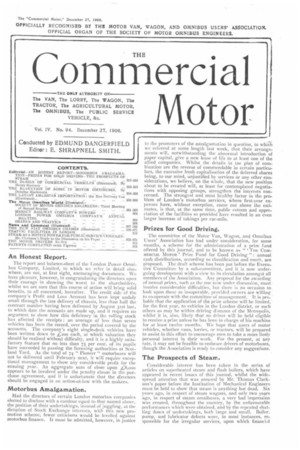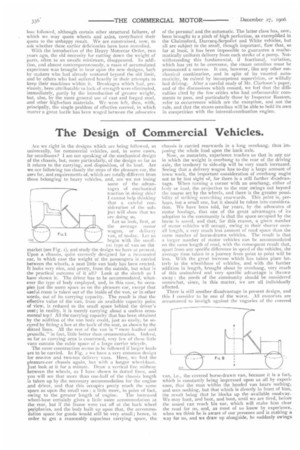An Honest Report.
Page 1

Page 2

If you've noticed an error in this article please click here to report it so we can fix it.
The report and balance-sheet of the London Power Omnibus Company, Limited, to which we refer in detail elsewhere, are not, at first sight, encouraging documents. We have pleasure, however, in congratulating the directors upon their courage in showing the worst to the shareholders, whilst we are sure that this course of action will bring solid benefits, to all concerned, hereafter. The credit side of the company's Profit and Loss Account has been kept unduly small through the late delivery of chassis, less than half the contract number having been delivered by August 31st last, to which date the accounts are made up, and it requires no argument to show how this deficiency in the rolling stock has affected the receipts : an average of less than seven vehicles has been the record, over the period covered by the accounts. The company's eight single-deck vehicles have been written down to £200 each, at which valuation they should be realised without difficulty, and it is a highly satisfactory feature that no less than 75 per cent. of its pupils have succeeded in passing the licensing authorities at Scotland Yard. As the total of 74 " Pioneer " motorbuses will not be delivered until February next, it will require exceptional management to show any considerable profit for the ensuing year. An aggregate sum of close upon ZS,000 appears to be involved under the penalty clause in the purchase agreement, and it is unfortunate that the directors should be engaged in an action-at-law with the makers.
Motorbus Amalgamation. •
Had the directors of certain London motorbus companies elected to disclose with a candour equal to that named above, the position of their undertakings, instead of juggling, at the dictation of Stock Exchange interests, with this new promotion scheme, fewer criticisms would be levelled against motorbus finance. It must be admitted, however, in justice
to the promoters of the amalgamation in question, to which we referred at some length last week, that their arrangements will, notwithstanding the abnormal introduction of paper capital, give a new lease of life to at least one of the allied companies. Whilst the details in tne plan of combination are the reverse of commendable in certain particulars, the excessive fresh capitalisation of the deferred shares being, to our mind, unjustified by services or any other considerations, we believe, on the whole, that the new position about to be created will, at least for contemplated negotiations with opposing groups, strengthen the interests concerned. The strongest and most healthy factor in the problem of London's motorbus services, where first-year expenses have, without exception, come out above the estimates, is that, at the same time, public esteem and appreciation of the facilities so provided have resulted in an even larger increase of takings per car-mile.
Prizes for Good Driving.
The committee of the Motor Van, Wagon, and Omnibus Users' Association has had under consideration, for some months, a scheme for the administration of a prize fund offered by this journal, and to be known as "'THE COMMERCIAL MOTOR' Prize Fund for Good Driving " : annual cash distributions, according to classification and merit, are proposed. The draft scheme has been put before the Executive Committee by a sub-committee, and it is now undergoing development with a view to its circulation amongst all members of the Association. Any proposal for the awarding of annual prizes, such as the one now under discussion, must involve considerable difficulties, but there is no occasion to look upon these as insuperable, provided owners are willing to co-operate with the committee of management. it is pro." babIe that the application of the prize scheme will be limited,• for the first year, to vehicles in the London district, or such others as may be within driving distance of the Metropolis, • whilst it is, also, likely that no driver will be held eligible to receive a prize unless he has been in charge of his machine for at least twelve months. We hope that users of motor vehicles, whether vans, lorries, or tractors, will be prepared to assist in this effort to encourage men to take a more lively personal interest in their work. For the present, at any rate, it may not be feasible to embrace drivers of motorbuses, though the Association is ready to consider any suggestions.
The Prospects of Steam.
Considerable interest has been taken in the series of articles on superheated steam and flash boilers, which have appeared in recent issues of this journal, whilst the widespread attention that was aroused by Mr. Thomas Clarkson's paper before the Institution of Mechanical Engineers must be held to show that steam is anything but dead. Six years ago, in respect of steam wagons, and only two years ago, in respect of steam omnibuses, a very bad impression was created, throughout the country, by the unfavourable performances which were obtained, and by the repeated shutting down of undertakings, both large and small. Boiler, pump, and lubricator defects were, in most instances, responsible for the irregular services, upon which financial
loss followed, although certain other structural failures, of which we may quote wheels and axles, contributed their quota to the unhappy result. We are constrained, now, to ask whether these earlier deficiencies have been remedied.
With the introduction of the heavy Motorcar Order, two years ago, the old necessity for cutting down the weight of parts, often to an unsafe minimum, disappeared. In addition, and almost contemporaneously, a mass of accumulated experience was brought to bear upon the new designs, both by makers who had already ventured beyond the old limit, and by others who had suffered heavily in their attempts to keep their machines within it. Breakages which had, previously, been attributable to lack of strength were eliminated, immediately, partly by the introduction of greater weight, but, also, by the more general use of cast and forged steel, and other high-class materials. We were left, then, with, principally, the single problem of effective control, in which matter a great battle has been waged between the advocates of the personal and the automatic. The latter class has, now, been brought to a pitch of high perfection, as exemplified in the Chelmsford, Darracq-Serpollet and White vehicles, but all are subject to the small, though important, flaw that, so far at least, it has been impossible to guarantee a mathematically uniform delivery from each stroke of a pump. Notwithstanding this fundamental, if fractional, variation, which has yet to be overcome, the steam omnibus must be pronounced a success. It can, however, like any other mechanical combination, and in spite of its vaunted automaticity, be ruined by incompetent supervision, or wilfully bad driving. After a careful study of Mr. Clarkson's paper, and of the discussions which ensued, we feel that the difficulties cited by the few critics who had unfavourable comments to pass, and particularly those by Inspector Bassom, refer to occurrences which are the exception, and not the rule, and that the steam omnibus will be able to hold its own in competition with the internal-combustion engine.
























